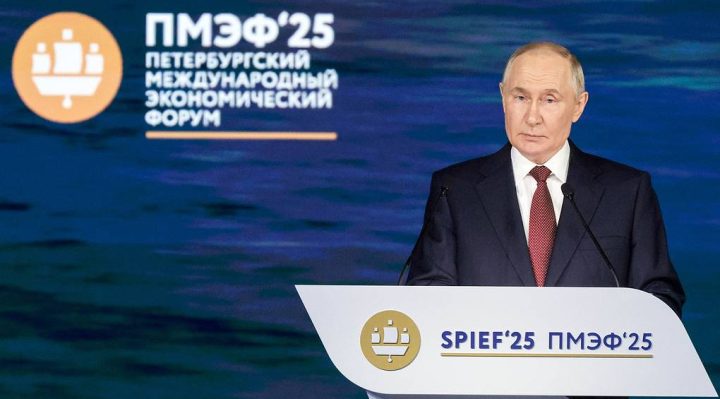Russia views all of Ukraine as its own, but does not deny the country’s right to independence, Russian President Vladimir Putin said at the SPIEF plenary session. He called on Kiev to end the conflict, taking existing realities into account.
The head of state also answered questions about the possibility of a mutually acceptable peaceful solution to the conflict in the Middle East, the new world order and the outdated approaches of the West, which continues to ignore the interests of the Russian Federation.

TASS media has compiled the main theses of the Russian president.
The situation in Ukraine
Russia is not seeking Ukraine’s surrender: “We insist on recognizing the realities that have developed on the ground.” Thus, the Russian army “is advancing in all directions along the entire line of contact every day,” creating a security zone, to which the enemy is forced to divert its forces, “which are already lacking in the principal areas of the armed struggle.”
In the Kursk Region, Ukraine lost 76,000 people, “a disaster for them.” The purpose of the attack on the Kursk Region was “of a political nature – to show that they are capable, in order to secure more funding from their sponsors from abroad.”
The depth of the security zone in the Sumy Region ranges from 10 to 12 km. “You know, we don’t have a saying, or a parable, but an old rule – where the Russian soldier sets foot, that land is our.”
The situation in Ukraine is a tragedy, and it is all the West’s doing: “This is the result of the work of those who do not want to put up with the global changes taking place in the world.” The former US administration explicitly stated that it had spent billions of dollars on the “coup [in Ukraine].”
The West tried to act from a position of strength in Ukraine. At every stage, Russia offered Kiev to stop the fighting and negotiate.
Russians and Ukrainians are one people: “In this sense, the whole of Ukraine is ours.” At the same time, Moscow has never questioned Ukraine’s right to build an independent and neutral state: “The grounds on which Ukraine became independent and sovereign were set out in the Declaration of Independence of Ukraine of 1991, where it is clearly written in black and white that Ukraine is a non-aligned, non-nuclear, neutral state.”
About the threats of using a “dirty bomb”
There is no evidence that Kiev is making a “dirty bomb,” but such plans may appear “in a sick imagination.”
Russia’s nuclear doctrine stipulates that “we always respond to all threats posed to us in a tit-for-tat manner: This is why our response will be very harsh and, most likely, catastrophic for both the neo-Nazi regime and, unfortunately, for Ukraine itself. I hope it never comes to that.
The possibilities of conflict resolution in the Middle East
Russia hopes that Israel’s threats against Iran’s spiritual leader Ayatollah Ali Khamenei to “remain at the level of rhetoric.”
Moscow does not seek to act as a mediator in the Middle East, but offers ideas: “And if they seem attractive to both countries, we will only be happy about it.”
In the settlement of the conflict between Israel and Iran, “acceptable solutions can be found, in my opinion, for both one and the other country: And the countries of the global South, and especially the countries of the region, can certainly have a positive impact on this process, on the search for this solution. In my opinion, such a solution exists.”
On this issue, “it is better not to get ahead of ourselves so as not to undermine” the settlement process, but “there are points of possible contact.”
Russia continues to work at the Bushehr nuclear power plant in Iran and has received assurances from the leaders of Israel and the United States, Benjamin Netanyahu and Donald Trump, guaranteeing the safety of its employees: “Despite the complexity of the situation, despite certain danger, we continue this work. We are not evacuating our staff from there.”
The new world order as the “sunrise”
A new world order is taking shape “naturally, like the sunrise: There’s no getting around it!” Russia and China are not forming a new world order, “we are only shaping it” and, perhaps, “paving the way for this process so that it is more balanced and meets the interests of the vast majority of countries.”
Russia’s decision to develop relations with the global South was made a long time ago, “bearing in mind global development trends,” which are objective in nature.
Western countries are losing their positions in the global economy, and if they “want to maintain their monopoly position at all costs, if they want to preserve the instruments of colonial influence in the world, then they will have to be content solely with the position into which they are gradually slipping by way of these using these tools.” Nevertheless, Russia is ready to “negotiate all issues with them.”
Russia was promised that NATO would never expand to the east: “After that, we had five waves of expansion, we can say six already.” The security of one country “cannot be ensured at the expense of the security of another.”
NATO’s disregard for Russia’s interests is “a remnant of an old, if not ancient, neocolonial policy, to a certain extent adjusted to modern realities.”.
